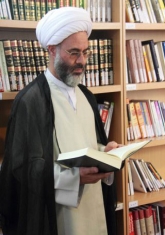
RNA – In an interview with Rasa News Agency, Hujjat al-Islam Abbas-Ali Zarei-Sabzevari, referred to the importance of “patience” in an analysis of some of the behaviours and actions of European and American politicians in violation of the Joint Comprehensive Plan of Action (JPCOA) and the effort to continue the negotiations on the issue of defensive hardware.
During his visit to the United Arab Emirates on November 9th, French President Emmanuel Macron proposed to amend the landmark 2015 nuclear deal to cover Iran’s ballistic missile capabilities.
The member of the General Assembly of the Society of Seminary Teachers of Qom stated, “Given the current circumstances, being patient is the main way to deal with the behaviours and actions by European and American politicians because through their statements, these politicians are attempting to establish favourable conditions for their own interests by creating psychological operations.”
Hujjat al-Islam Zarei-Sabzevari said that the guidelines of the Supreme Leader of the Islamic Revolution, Ayatollah Sayyed Ali Khamenei, demonstrated that the Islamic model of “patience” in the face of such impudent behaviours has limits and borderlines.
“That which is clear to us is the fact that if these behaviours are meant to attack the limits of the red lines of the Islamic system, the Supreme Leader will determine the best way to deal with the Europeans and Americans,” he stressed.
The teacher in the Islamic Seminary added, “I believe that the statesmen and elites in such circumstances must only proceed on the path of the policies of the Supreme Leader of the Islamic Revolution. For this reason, any decision determined by the Supreme Leader will be the final chapter for all the sections of the Islamic society – from the elite to the lower levels.”
Hujjat al-Islam Zarei-Sabzevari said the statements by Western politicians must not be the criterion for the actions of the elite and added, “The decision and guidelines of the Supreme Leader should be the model and principle of Iran’s national strategy in the political and cultural fields.”
Iran and the five permanent members of the United Nations Security Council – the United States, France, the United Kingdom, Russia and China – plus Germany signed the he Joint Comprehensive Plan of Action (JCPOA) on July 14, 2015 and started implementing it on January 16, 2016. Under the JCPOA, Iran put limits on its nuclear program in exchange for the removal of nuclear-related sanctions imposed against Tehran.
The IAEA has once again verified that Iran remains in compliance with its commitments under the landmark nuclear agreement which is in directly contradiction of Washington’s claims about Iran’s nuclear deal.